Unity College presents Spring Film Series (Free!)
| Through its provocative film series, Unity College aims to expand individuals' perspectives of the global landscape. The remarkable vision of these filmmakers encourages the community to engage in activism, promote environmental stewardship, and most of all, inspire hope. |
|
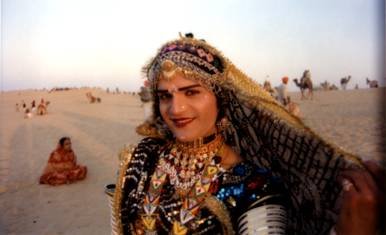 Gypsy Caravan
Gypsy Caravan
Thursday January 17 at 7pm You cannot walk straight when the road bends -- Romani Proverb Gypsy Caravan is a dazzling display of the musical world of the Roma, juxtaposed to the real world they live in. This rich feature documentary celebrates the luscious music of top international Gypsy performers, captured during the World Music Institute's Gypsy Caravan tour, and interweaves stirring real life looks at their home life and personal stories. Shot by documentary icon Albert Maysles, the film takes place on tour in Europe and in the USA during the concert tour, and on location in Spain, Macedonia, Romania and India. Directed by Jasmine Dellal whose previous feature, AMERICAN GYPSY, won international acclaim for its portrait of an American Romani family battling a decade of drama. |
|
|
Pedal to the Midnight Sun 67 minutes
Thursday January 24, 7pm A 2006 expedition capturing the wretched and glorious moments in a continent sized endeavor. Pedal to the Midnight Sun is a humorous documentary of a triumphant journey to the Arctic. Josh Thomas and J.J. Kelley rely only on their bodies and bicycles as they venture north. It is a story of youthful teammates finding themselves and an amazing landscape.
On July 7, 2006 having stopped by an Alaska wedding in the wilderness, taking a flight plane to the glaciers and tallest mountains of North America, and visited the real Santa Clause in the North Pole: Kelley and Thomas arrive at the petroleum fields of the Arctic Ocean. Having run out of road Kelley and Thomas face a new challenge; having placed so much of your heart into a single goal: what do you do after you found the place you were looking for |
|
|
Postmen in the Mountains
Thursday January 31, 7pm Father (Teng Rujun) has been a postman all his life. His job is to deliver mail to the remote mountain areas of Hunan, China by foot. He is in his late 40s. 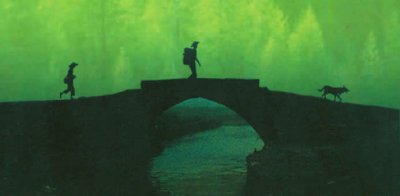 But now, poor health is forcing him to retire. He cannot trust anyone else but his son (Liu Ye) to take over the job. The morning comes that Son is ready for his first trip as a postman. It's going to be a 3-day trip., 122 kilometers, as it always is. Father cannot rest easy, and insists that he will come along, knowing the importance of his job, and not quite able to give it up.
This is Son's first trip and Father's last. They have never taken a trip together. The mountain paths are so familiar under Father's feet. However, walking them with his son makes him feel strange. He has so much to say to him, but what comes out of his mouth is only about the job. And Son doesn't even know how to address his own father properly. The word "father" sounds so awkward to pronounce to him. But now, poor health is forcing him to retire. He cannot trust anyone else but his son (Liu Ye) to take over the job. The morning comes that Son is ready for his first trip as a postman. It's going to be a 3-day trip., 122 kilometers, as it always is. Father cannot rest easy, and insists that he will come along, knowing the importance of his job, and not quite able to give it up.
This is Son's first trip and Father's last. They have never taken a trip together. The mountain paths are so familiar under Father's feet. However, walking them with his son makes him feel strange. He has so much to say to him, but what comes out of his mouth is only about the job. And Son doesn't even know how to address his own father properly. The word "father" sounds so awkward to pronounce to him.
|
|
|
Black Gold
Thursday February 7, 7pm As westerners revel in designer lattes and cappuccinos, impoverished Ethiopian coffee growers suffer the bitter taste of injustice. In this eye-opening expose of the multi-billion dollar industry, Black Gold traces one man's fight for a fair price. 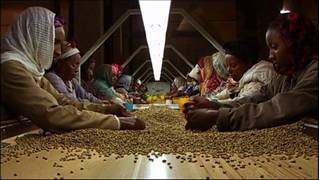 Multinational coffee companies now rule our shopping malls and supermarkets and dominate the industry worth over $80 billion, making coffee the most valuable trading commodity in the world after oil.
But while we continue to pay for our lattes and cappuccinos, the price paid to coffee farmers remains so low that many have been forced to abandon their coffee fields.Nowhere is this paradox more evident than in Ethiopia, the birthplace of coffee. Tadesse Meskela is one man on a mission to save his 74,000 struggling coffee farmers from bankruptcy. As his farmers strive to harvest some of the highest quality coffee beans on the international market, Tadesse travels the world in an attempt to find buyers willing to pay a fair price.Against the backdrop of Tadesse's journey to London and Seattle, the enormous power of the multinational players that dominate the world's coffee trade becomes apparent. New York commodity traders, the international coffee exchanges, and the double dealings of trade ministers at the World Trade Organisation reveal the many challenges Tadesse faces in his quest for a long term solution for his farmers.
Multinational coffee companies now rule our shopping malls and supermarkets and dominate the industry worth over $80 billion, making coffee the most valuable trading commodity in the world after oil.
But while we continue to pay for our lattes and cappuccinos, the price paid to coffee farmers remains so low that many have been forced to abandon their coffee fields.Nowhere is this paradox more evident than in Ethiopia, the birthplace of coffee. Tadesse Meskela is one man on a mission to save his 74,000 struggling coffee farmers from bankruptcy. As his farmers strive to harvest some of the highest quality coffee beans on the international market, Tadesse travels the world in an attempt to find buyers willing to pay a fair price.Against the backdrop of Tadesse's journey to London and Seattle, the enormous power of the multinational players that dominate the world's coffee trade becomes apparent. New York commodity traders, the international coffee exchanges, and the double dealings of trade ministers at the World Trade Organisation reveal the many challenges Tadesse faces in his quest for a long term solution for his farmers.
|
|
|
Sierra Leone Refugee Allstars
Thursday February 14, 7pm 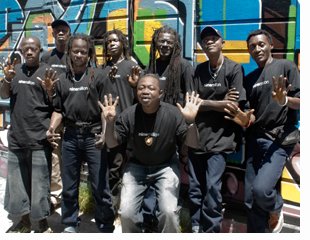 The plight of the refugee in today's war-torn world is captured in the African proverb, "When two elephants are fighting, the grass will suffer. So it was in Sierra Leone from 1991-2002, where the government and various rebel factions carried out a brutal civil war in which the terrorizing of civilians — by killing, mutilation, rape, and forced conscription — was common practice on all sides. The war sent hundreds of thousands of ordinary Sierra Leoneans fleeing to refugee camps in the neighboring West African nation of the Republic of Guinea. That's where the remarkable documentary Sierra Leone's Refugee All Stars begins.
Sierra Leone's Refugee All Stars are a band of six Sierra Leonean musicians who came together to form a band while living in a refugee camp in Guinea. Many of their family and friends were murdered in the war, leaving each of them with physical and emotional scars that may never heal. Despite the unimaginable horrors of civil war, they were saved and brought hope and happiness to their fellow refugees through their music.
The plight of the refugee in today's war-torn world is captured in the African proverb, "When two elephants are fighting, the grass will suffer. So it was in Sierra Leone from 1991-2002, where the government and various rebel factions carried out a brutal civil war in which the terrorizing of civilians — by killing, mutilation, rape, and forced conscription — was common practice on all sides. The war sent hundreds of thousands of ordinary Sierra Leoneans fleeing to refugee camps in the neighboring West African nation of the Republic of Guinea. That's where the remarkable documentary Sierra Leone's Refugee All Stars begins.
Sierra Leone's Refugee All Stars are a band of six Sierra Leonean musicians who came together to form a band while living in a refugee camp in Guinea. Many of their family and friends were murdered in the war, leaving each of them with physical and emotional scars that may never heal. Despite the unimaginable horrors of civil war, they were saved and brought hope and happiness to their fellow refugees through their music.
|
|
|
Iraq in Fragments 94 minutes.
Thursday February 28, 7pm  An opus in three parts, Iraq In Fragments offers a series of intimate, passionately-felt portraits: A fatherless 11-year-old is apprenticed to the domineering owner of a Baghdad garage; Sadr followers in two Shiite cities rally for regional elections while enforcing Islamic law at the point of a gun; a family of Kurdish farmers welcomes the US presence, which has allowed them a measure of freedom previously denied.
American director James Longley spent more than two years filming in Iraq to create this stunningly photographed, poetically rendered documentary of the war-torn country as seen through the eyes of Sunnis, Shiites and Kurds. Winner of Best Director, Best Cinematography and Best Editing awards in the 2006 Sundance Film Festival documentary competition, the film was also awarded the Grand Jury Prize at the 2006 Full Frame Documentary Film Festival, and nominated for an Academy Award for Best Documentary Feature in 2007.
An opus in three parts, Iraq In Fragments offers a series of intimate, passionately-felt portraits: A fatherless 11-year-old is apprenticed to the domineering owner of a Baghdad garage; Sadr followers in two Shiite cities rally for regional elections while enforcing Islamic law at the point of a gun; a family of Kurdish farmers welcomes the US presence, which has allowed them a measure of freedom previously denied.
American director James Longley spent more than two years filming in Iraq to create this stunningly photographed, poetically rendered documentary of the war-torn country as seen through the eyes of Sunnis, Shiites and Kurds. Winner of Best Director, Best Cinematography and Best Editing awards in the 2006 Sundance Film Festival documentary competition, the film was also awarded the Grand Jury Prize at the 2006 Full Frame Documentary Film Festival, and nominated for an Academy Award for Best Documentary Feature in 2007.
|
|
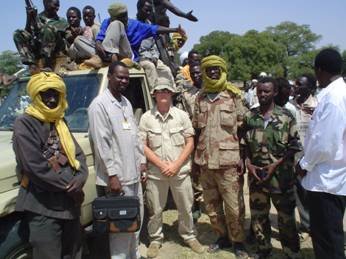 The Devil Came on Horseback 85 minutes.
The Devil Came on Horseback 85 minutes.
Thursday March 6, 7pm Using the exclusive photographs and first hand testimony of former U.S. Marine Captain Brian Steidle, THE DEVIL CAME ON HORSEBACK takes the viewer on an emotionally charged journey into the heart of Darfur, Sudan, where an Arab run government is systematically executing a plan to rid the province of its black African citizens. As an official military observer, Steidle had access to parts of the country that no journalist could penetrate. He was unprepared for what he would witness and experience, including being fired upon, taken hostage, and being unable to intervene to save the lives of young children. Ultimately frustrated by the inaction of the international community, Steidle resigned and returned to the US to expose the images and stories of lives systematically destroyed. |
|
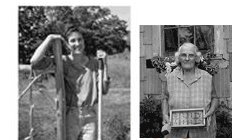 Maine Women Living on the Land 85 minutes.
Maine Women Living on the Land 85 minutes.
Thursday March 27, 7pm All these women know that living in a place involves responsibility for it, though each expresses her commitment in a different way. They have chosen lives that are unforgivingly integrated with the land, that involves and intricate give and take expressed through daily routine, in collaboration with soil, weather and community. Lauren Shaw offers us a model for a modern life that does not have amnesia, that considers both yesterdays and tomorrows. |
|
 Kamp Katrina 72 minutes.
Kamp Katrina 72 minutes.
Thursday April 3, 7pm Ms. Pearl — a New Orleans native — converts her backyard into a tent city where 14 displaced people live for 6 months. She provides construction jobs and basic resources to help them assist in rebuilding the city. The situation gradually goes violently awry and she is confronted with an array of abuses amidst a broken city. |
|
|
King Korn 90 minutes.
Thursday April 10, 7pm 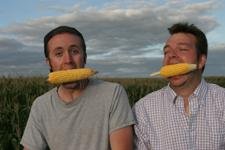 Almost everything Americans eat contains corn: high fructose corn syrup, corn-fed meat, and
corn-based processed foods are the staples of the modern diet. Ready for an adventure and
alarmed by signs of their generation's bulging waistlines, college friends Ian Cheney and Curt
Ellis know where to go to investigate. Eighty years ago, Ian and Curt's great-grandfathers lived
just a few miles apart, in the same rural county in northern Iowa. Now their great-grandsons are
returning with a mission: they will plant an acre of corn, follow their harvest into the world, and
attempt to understand what they—and all of us—are really made of.
Ian and Curt arrive in the Midwest enthusiastic about their new endeavor. Iowa's newest farmers
lease an acre of land from a skeptical landlord and fill out a pile of paperwork to sign up for
subsidies. The government will pay them $28 to grow their acre of corn—the first of many steps
that reinforce the idea that more corn is what America needs.
Ian and Curt start the spring by injecting ammonia fertilizer. The chemical promises to increase
yields fourfold, fueling the mission of abundance laid out for them. Then it's planting time, and
with a rented tractor, Ian and Curt set 31,000 seeds in the ground in 18 minutes. Their seed has
been genetically modified for high yields and herbicide tolerance, and when the seedlings sprout,
Ian and Curt apply a powerful spray to ensure that only their corn will thrive on their acre.
But where will all that corn go Ian and Curt leave Iowa to find out, first considering their crop's
future as feed. In Colorado, rancher Sue Jarrett says her cattle should be eating grass. But with a
surplus of corn, it costs less to raise cattle in confinement than to let them roam free: "The mass
production of corn drives the mass production of protein in confinement. Animal nutritionists
confirm that corn makes cows sick and beef fatty, but it also lets consumers eat a $1 hamburger.
Feedlot owner Bob Bledsoe defends America's cheap food, but as Ian and Curt see in Colorado,
the world behind it can be stomach turning. At one feedlot, 100,000 cows stand shoulder-to-
shoulder, doing their part to transform Iowa corn into millions of pounds of fat-streaked beef.
Following the trail of high fructose corn syrup, Ian and Curt attempt to make a home-cooked
batch of the sweetener in their kitchen. But their investigation of America's most ubiquitous
ingredient turns serious when they follow soda to its consumption in Brooklyn. Here, Type II
diabetes is ravaging the community, and America's addiction to corny sweets is to blame.
The breadth of the problem is now clear: the American food system is built on the abundance of
corn, an abundance perpetuated by a subsidy system that pays farmers to maximize production.
In a nursing home in the Indiana suburbs, Ian and Curt come face-to-face with Earl Butz, the
Nixon-era Agriculture Secretary who invented subsidies. The elderly Butz champions the
modern food system as an "Age of plenty Ian and Curt's great-grandfathers only dreamed of.
November pulls Ian and Curt back to Iowa. Their 10,000-pound harvest seems as grotesque as it
is abundant. They haul their corn to the elevator and look on as it makes its way into a food
system they have grown disgusted by. At a somber farm auction, Ian and Curt decide to tell their
landlord they want to buy the acre. The next spring their cornfield has been pulled from production and planted in a prairie, a wild square surrounded by a sea of head-high corn.
Almost everything Americans eat contains corn: high fructose corn syrup, corn-fed meat, and
corn-based processed foods are the staples of the modern diet. Ready for an adventure and
alarmed by signs of their generation's bulging waistlines, college friends Ian Cheney and Curt
Ellis know where to go to investigate. Eighty years ago, Ian and Curt's great-grandfathers lived
just a few miles apart, in the same rural county in northern Iowa. Now their great-grandsons are
returning with a mission: they will plant an acre of corn, follow their harvest into the world, and
attempt to understand what they—and all of us—are really made of.
Ian and Curt arrive in the Midwest enthusiastic about their new endeavor. Iowa's newest farmers
lease an acre of land from a skeptical landlord and fill out a pile of paperwork to sign up for
subsidies. The government will pay them $28 to grow their acre of corn—the first of many steps
that reinforce the idea that more corn is what America needs.
Ian and Curt start the spring by injecting ammonia fertilizer. The chemical promises to increase
yields fourfold, fueling the mission of abundance laid out for them. Then it's planting time, and
with a rented tractor, Ian and Curt set 31,000 seeds in the ground in 18 minutes. Their seed has
been genetically modified for high yields and herbicide tolerance, and when the seedlings sprout,
Ian and Curt apply a powerful spray to ensure that only their corn will thrive on their acre.
But where will all that corn go Ian and Curt leave Iowa to find out, first considering their crop's
future as feed. In Colorado, rancher Sue Jarrett says her cattle should be eating grass. But with a
surplus of corn, it costs less to raise cattle in confinement than to let them roam free: "The mass
production of corn drives the mass production of protein in confinement. Animal nutritionists
confirm that corn makes cows sick and beef fatty, but it also lets consumers eat a $1 hamburger.
Feedlot owner Bob Bledsoe defends America's cheap food, but as Ian and Curt see in Colorado,
the world behind it can be stomach turning. At one feedlot, 100,000 cows stand shoulder-to-
shoulder, doing their part to transform Iowa corn into millions of pounds of fat-streaked beef.
Following the trail of high fructose corn syrup, Ian and Curt attempt to make a home-cooked
batch of the sweetener in their kitchen. But their investigation of America's most ubiquitous
ingredient turns serious when they follow soda to its consumption in Brooklyn. Here, Type II
diabetes is ravaging the community, and America's addiction to corny sweets is to blame.
The breadth of the problem is now clear: the American food system is built on the abundance of
corn, an abundance perpetuated by a subsidy system that pays farmers to maximize production.
In a nursing home in the Indiana suburbs, Ian and Curt come face-to-face with Earl Butz, the
Nixon-era Agriculture Secretary who invented subsidies. The elderly Butz champions the
modern food system as an "Age of plenty Ian and Curt's great-grandfathers only dreamed of.
November pulls Ian and Curt back to Iowa. Their 10,000-pound harvest seems as grotesque as it
is abundant. They haul their corn to the elevator and look on as it makes its way into a food
system they have grown disgusted by. At a somber farm auction, Ian and Curt decide to tell their
landlord they want to buy the acre. The next spring their cornfield has been pulled from production and planted in a prairie, a wild square surrounded by a sea of head-high corn.
|
|
|
The Chances of the World Changing 99 minutes.
Thursday April 17, 7pm  An artist abandons his life's work to build an ark filled with hundreds of endangered animals. A marathon story creates a new breed of dramatic nature film: about time, death, art, love...and turtles.
An artist abandons his life's work to build an ark filled with hundreds of endangered animals. A marathon story creates a new breed of dramatic nature film: about time, death, art, love...and turtles.
|
|
|
Bullshit 73 minutes.
Thursday April 24, 7pm 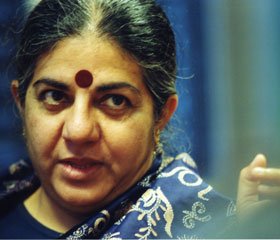 Her opponents call her "The Green Killer . They gave her "The Bullshit Award for sustaining poverty. TIME says she is a hero of our times, an icon for youngsters all over the world.
The film is about Vandana Shiva, Indian environmental activist and nuclear physicist, who was awarded the Right Livelihood Award in 1993. It's a film on globalisation and patenting, on genetic engineering, bio-piracy, indigenous knowledge.
In this documentary, the filmmakers follow Vandana Shiva over a two-year period, from her organic farm at the foot of the Himalayas to institutions of power all over the world. Here Vandana Shiva does battle with one of her toughest opponents, Monsanto, a huge American biotech company, when they try to patent an ancient Indian strain of wheat. Together with Dalits she tries to close down a Coca-Cola plant in Kerala, in a conflict involving groundwater pollution. In this film Vandana Shiva also tackles the question of farmers' suicide, a backlash of the globalisation.
The filmmakers describe Monsanto from the inside and arrange what proves a shaking meeting between Vandana Shiva and Barun Mitra, liberal think-tank, lobbyist and fierce critic of Vandana Shiva – and the man who gave her the "Bullshit Prize .
Her opponents call her "The Green Killer . They gave her "The Bullshit Award for sustaining poverty. TIME says she is a hero of our times, an icon for youngsters all over the world.
The film is about Vandana Shiva, Indian environmental activist and nuclear physicist, who was awarded the Right Livelihood Award in 1993. It's a film on globalisation and patenting, on genetic engineering, bio-piracy, indigenous knowledge.
In this documentary, the filmmakers follow Vandana Shiva over a two-year period, from her organic farm at the foot of the Himalayas to institutions of power all over the world. Here Vandana Shiva does battle with one of her toughest opponents, Monsanto, a huge American biotech company, when they try to patent an ancient Indian strain of wheat. Together with Dalits she tries to close down a Coca-Cola plant in Kerala, in a conflict involving groundwater pollution. In this film Vandana Shiva also tackles the question of farmers' suicide, a backlash of the globalisation.
The filmmakers describe Monsanto from the inside and arrange what proves a shaking meeting between Vandana Shiva and Barun Mitra, liberal think-tank, lobbyist and fierce critic of Vandana Shiva – and the man who gave her the "Bullshit Prize .
|
|
|
Standing Silent Nation
Thursday May 1, 7pm  Alex White Plume and his extended Lakota family, or tiospaye, are known on South Dakota's Pine Ridge Reservation for the determination and industriousness with which they have faced the hard economic choices imposed by history and reservation life. Undeterred by poor soil and uncertain weather on their land, the White Plumes planted alfalfa, barley and corn and raised horses and buffalo, all of which brought the family little better than a subsistence life and continued reliance on government subsidies. Still, the family was resolved to achieve economic self-sufficiency, thus preserving the Lakota traditions and bonds that sustain the identity of family and tribe.
After much research, and under Alex's leadership, the family planted industrial hemp, the non-psychoactive relative of marijuana. As Alex discovered, the world is in the midst of a boom market for hemp products. The demand is no less in the United States, with this anomaly: Hemp products can be sold here, but growing hemp is a felony. Alex didn't aim to challenge the logic of the federal government's drug war; he believed that tribal sovereignty allowed him to plant hemp as surely as it allowed Native Americans to build and run casinos elsewhere. He was wrong.
Alex White Plume and his extended Lakota family, or tiospaye, are known on South Dakota's Pine Ridge Reservation for the determination and industriousness with which they have faced the hard economic choices imposed by history and reservation life. Undeterred by poor soil and uncertain weather on their land, the White Plumes planted alfalfa, barley and corn and raised horses and buffalo, all of which brought the family little better than a subsistence life and continued reliance on government subsidies. Still, the family was resolved to achieve economic self-sufficiency, thus preserving the Lakota traditions and bonds that sustain the identity of family and tribe.
After much research, and under Alex's leadership, the family planted industrial hemp, the non-psychoactive relative of marijuana. As Alex discovered, the world is in the midst of a boom market for hemp products. The demand is no less in the United States, with this anomaly: Hemp products can be sold here, but growing hemp is a felony. Alex didn't aim to challenge the logic of the federal government's drug war; he believed that tribal sovereignty allowed him to plant hemp as surely as it allowed Native Americans to build and run casinos elsewhere. He was wrong.
|
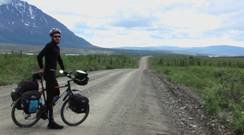 Thomas and Kelley meet up in the small fishing town of Seward, Alaska. After a winter of correspondence over essential gear, food, and expectations for the summer's expedition, Kelley and Thomas begin a PEDAL TO THE MIDNIGHT SUN. Set to embark on a 1,300-mile journey across America's last frontier the two young men say their farewells to a small group of well-wishers. They mount their loaded bikes brimming with the confidence of youth and bike off carrying just a bit of rations that will sustain them.
Thomas and Kelley meet up in the small fishing town of Seward, Alaska. After a winter of correspondence over essential gear, food, and expectations for the summer's expedition, Kelley and Thomas begin a PEDAL TO THE MIDNIGHT SUN. Set to embark on a 1,300-mile journey across America's last frontier the two young men say their farewells to a small group of well-wishers. They mount their loaded bikes brimming with the confidence of youth and bike off carrying just a bit of rations that will sustain them.